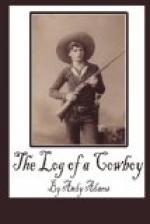It is questionable if we would have turned this stampede before daybreak, had not the nature of the country come to our assistance. Something over two miles below the camp of the last herd was a deep creek, the banks of which were steep and the passages few and narrow. Here we succeeded in turning the leaders, and about half the outfit of the mixed herd remained, guarding the crossing and turning the lagging cattle in the run as they came up. With the leaders once turned and no chance for the others to take a new lead, we had the entire run of cattle turned back within an hour and safely under control. The first outfit joined us during the interim, and when day broke we had over forty men drifting about ten thousand cattle back up the trail. The different outfits were unfortunately at loggerheads, no one being willing to assume any blame. Flood hunted up the foreman of the mixed herd and demanded an apology for his remarks on our abrupt meeting with him the night before; and while it was granted, it was plain that it was begrudged. The first herd disclaimed all responsibility, holding that the stampede was due to an unavoidable accident, their cattle having grown restless during their enforced lay-over. The indifferent attitude of their foreman, whose name was Wilson, won the friendly regard of our outfit, and before the wagon of the mixed cattle was reached, there was a compact, at least tacit, between their outfit and ours. Our foreman was not blameless, for had we taken the usual precaution and camped at least a mile off the trail, which was our custom when in close proximity to other herds, we might and probably would have missed this mix-up, for our herd was inclined to be very tractable. Flood, with all his experience, well knew that if stampeded cattle ever got into a known trail, they were certain to turn backward over their course; and we were now paying the fiddler for lack of proper precaution.
Within an hour after daybreak, and before the cattle had reached the camp of the mixed herd, our saddle horses were sighted coming over a slight divide about two miles up the trail, and a minute later McCann’s mules hove in sight, bringing up the rear. They had made a start with the first dawn, rightly reasoning, as there was no time to leave orders on our departure, that it was advisable for Mahomet to go to the mountain. Flood complimented our cook and horse wrangler on their foresight, for the wagon was our base of sustenance; and there was little loss of time before Barney McCann was calling us to a hastily prepared breakfast. Flood asked Wilson to bring his outfit to our wagon for breakfast, and as fast as they were relieved from herd, they also did ample justice to McCann’s cooking. During breakfast, I remember Wilson explaining to Flood what he believed was the cause of the stampede. It seems that there were a few remaining buffalo ranging north of the Wichita, and at night when they came into the river to drink they had scented the cattle on the south side. The bellowing of buffalo bulls had been distinctly heard by his men on night herd for several nights past. The foreman stated it as his belief that a number of bulls had swum the river and had by stealth approached near the sleeping cattle,—then, on discovering the presence of the herders, had themselves stampeded, throwing his herd into a panic.




